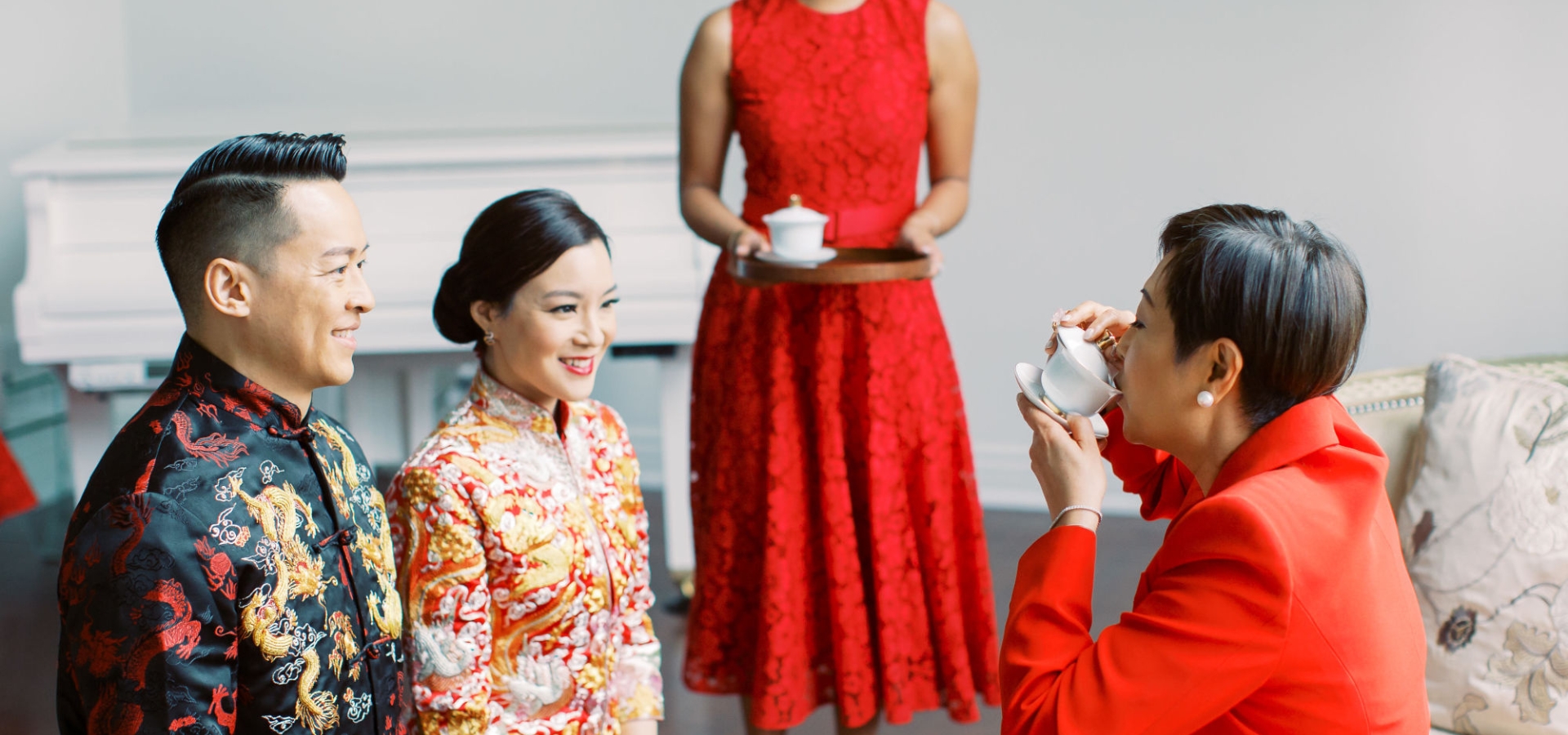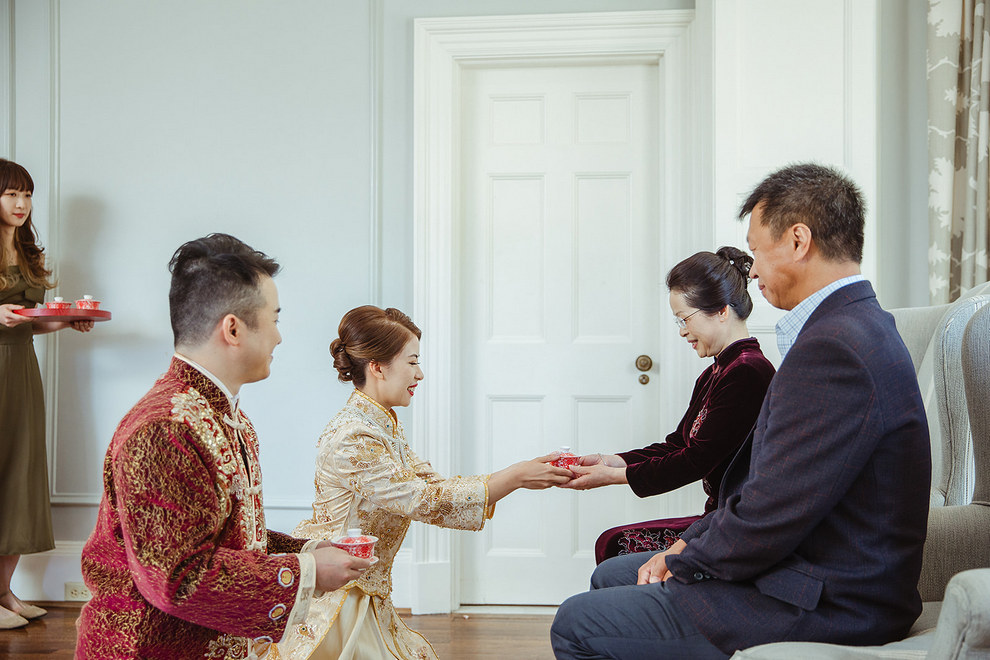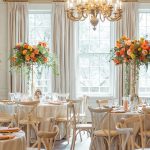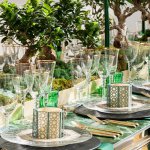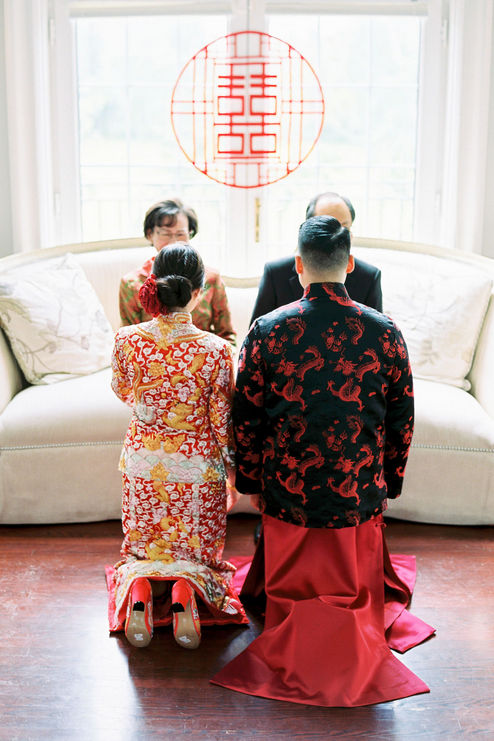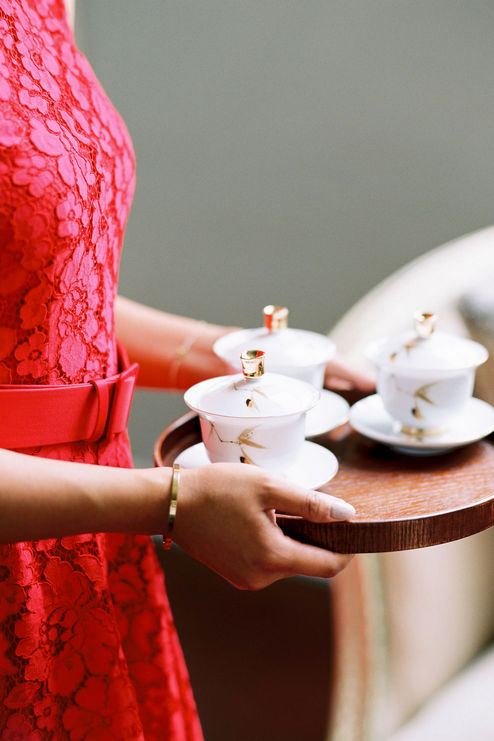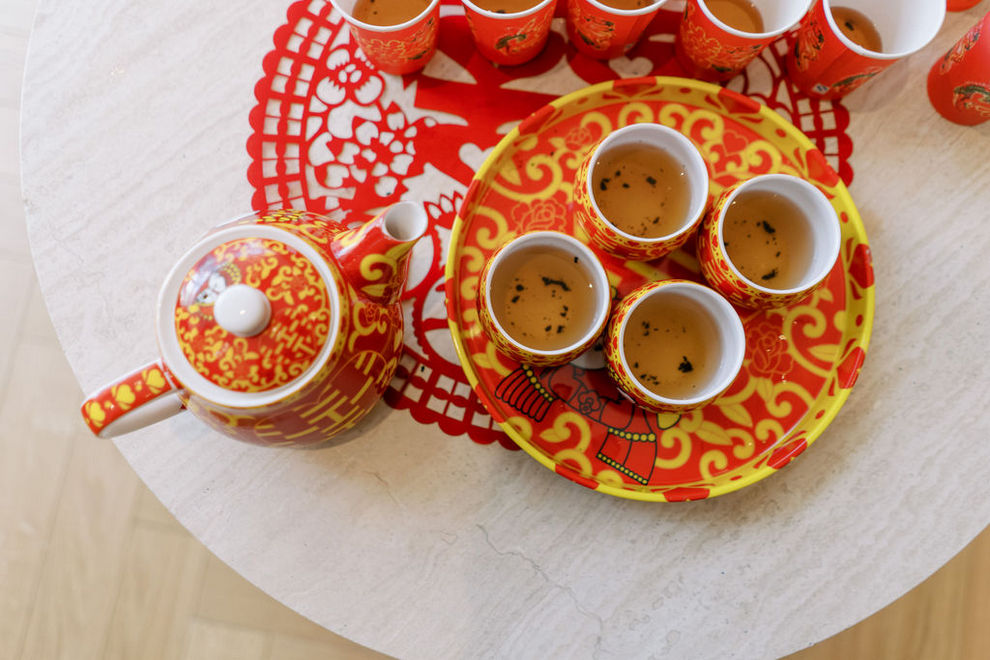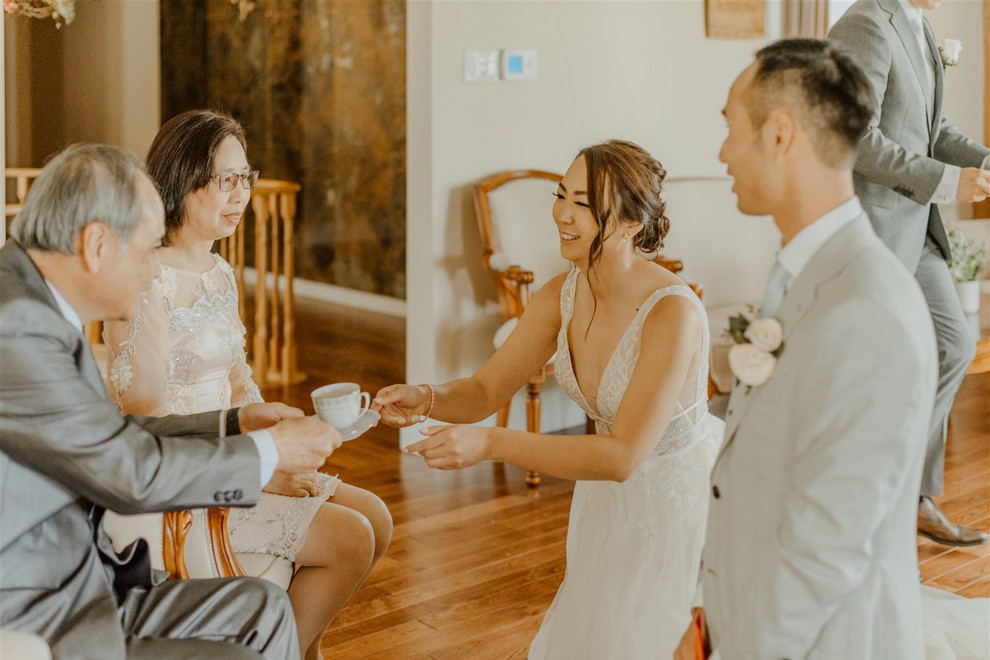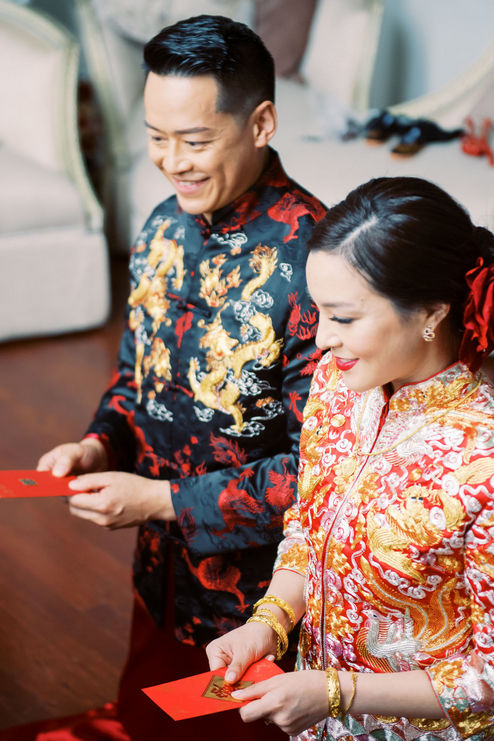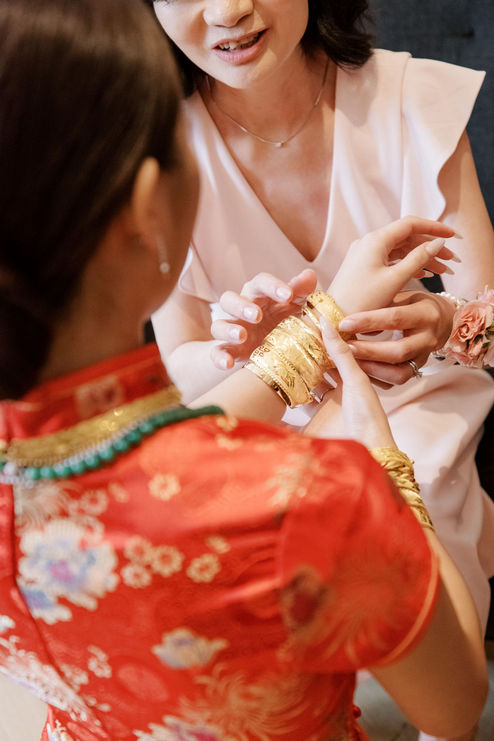The Chinese wedding tea ceremony is more than a ritual; it’s a gesture of reverence, a bond between families, and a reflection of heritage. When hosting a Chinese tea ceremony, I believe it’s important to allow your personalities to shine through while at the same time, embracing the deep-rooted history of this time-honoured tradition.
When planning your wedding, embracing tradition can add depth and significance to your celebration. The Chinese wedding tea ceremony is a timeless ritual that bridges the past and the future, honoring both your love story and your cultural heritage.
Photo Courtesy of Capso Studio
A brief History on the Chinese Tea Ceremony
The Chinese wedding tea ceremony symbolizes respect, gratitude, and unity. By serving tea to parents and elders, couples seek blessings, and offer a gesture of appreciation. This ritual signifies the fusion of families, the continuity of tradition, and the love shared between two individuals.
Choosing the Perfect Location:
The venue you select for your Chinese wedding tea ceremony can enhance the entire experience. Much like the choice of attire, the setting carries its own significance. The ceremony’s location often sets the tone for your tea ceremony, whether it’s an intimate affair, an outdoor garden gathering, or an integral part of your reception.
Private Outdoor Setting:
For a touch of natural serenity, consider a private outdoor tea ceremony. Imagine the soft sounds of rustling leaves and the cool air of a gentle breeze as you exchange vows of respect and love. This setting allows your guests to share in this heartfelt moment while taking in the natural surroundings.
When it comes to celebrating love and tradition in Toronto, the city offers a plethora of enchanting outdoor venues for your Chinese tea ceremony. These venues provide the perfect blend of natural beauty and cultural significance. Among them, three remarkable options stand out for hosting an unforgettable Chinese tea ceremony in the great outdoors:
- Graydon Hall Manor: A Timeless Beauty – Nestled amidst lush greenery, Graydon Hall Manor exudes timeless elegance. Its picturesque gardens, terraces, and charming courtyard create a romantic backdrop for your tea ceremony. With the tranquility of nature all around, you can share this cherished tradition in an atmosphere of sheer enchantment.
- Harding Waterfront Estate: Along the Gentle Shores – Imagine exchanging tea cups with the serene waters of Lake Ontario as your backdrop. The Harding Waterfront Estate offers just that. This stunning venue features exquisite outdoor spaces where you can honour your heritage and create lasting memories by the water’s edge. It’s a truly unique and breathtaking location.
- Evergreen Brick Works: Where Nature Meets Tradition – Evergreen Brick Works, situated within the Don Valley, seamlessly blends nature and history. Its lush gardens, serene ponds, and rustic brick buildings provide an ideal setting for an outdoor tea ceremony. Here, you can celebrate tradition surrounded by the beauty of nature and the charm of the city
You May Also Be Interested In
Toronto’s Top 8 Best Chinese Wedding Planners
Dates to Avoid Hosting Your Wedding in 2025 & 2026
The Year of the Dog: A Lunar New Year Inspired Style Shoot
Intimate Family Gathering:
To preserve the cherished intimacy of the tea ceremony, opt for a small gathering at home. Hosting your parents, elders, and close family members in a familiar setting adds a sense of comfort and personal connection to the ritual.
Photo Courtesy of Will Reid Photography
Incorporating the Wedding Venue:
For couples aiming to include their entire guest list, selecting a spacious venue is essential. It’s worth exploring whether your chosen reception venue offers a suitable space or patio to accommodate this special ceremony. Some venues even offer the flexibility to transform a room, seamlessly transitioning from the tea ceremony to the main reception.
What Tea To Serve
Selecting the right tea to serve at a Chinese tea ceremony is a significant aspect of this tradition. The type of tea you choose can convey various meanings and set the tone for your ceremony. Here are some popular options:
- Green Tea (?? – l?chá): Green tea is a classic choice for Chinese tea ceremonies. It symbolizes purity, harmony, and a fresh start. Longjing tea, also known as Dragon Well tea, is a famous green tea often used for this purpose.
- Black Tea (?? – hóngchá): Black tea, such as Keemun or lapsang souchong, can be served to symbolize a deep and long-lasting commitment. It represents strength and is a fitting choice for couples seeking a strong and enduring bond.
- Oolong Tea (??? – w?lóngchá): Oolong tea is known for its rich and complex flavours. It symbolizes the idea that love evolves over time, just like the tea leaves that change as they steep. It represents a journey of growth and transformation in your relationship.
- Jasmine Tea (???? – mòlìhu? chá): Jasmine tea is fragrant and soothing, representing the sweetness and beauty of your love. It’s often chosen for its calming qualities and pleasant aroma.
- Herbal Tea: Some couples opt for herbal teas, such as chrysanthemum or rose tea, which can symbolize purity, love, and devotion. These teas are caffeine-free and offer a gentle, floral taste.
- Pu-erh Tea (??? – p?’?rchá): Pu-erh tea is fermented and aged, representing a deep and lasting commitment. It’s known for its robust and earthy flavor, making it a unique choice for a tea ceremony.
- White Tea (?? – báichá): White tea is delicate and subtle, symbolizing purity and new beginnings. It’s a graceful choice for couples embarking on their journey together.
When selecting a tea for your Chinese tea ceremony, consider your personal preferences, the meaning you want to convey, and the tastes of your guests. Some couples even choose to serve a variety of teas, allowing guests to choose their favorite. Regardless of the tea you choose, remember that the act of serving and sharing tea with your loved ones is at the heart of the ceremony, and it’s the sentiment behind the gesture that truly matters.
Photo Courtesy of Artiese Studios
Attire and Atmosphere:
Embrace tradition by incorporating elements of Chinese attire while allowing your individuality to shine. Infuse this personal touch into your décor, utilizing auspicious colors and meaningful symbols.
First, decide whether you’ll have separate ceremonies or a combined one. Modern couples often opt for a single ceremony that honors both sides of the family.
- Auspicious Colours: Colours play a pivotal role in Chinese culture, each carrying its own symbolism. Incorporating auspicious colors into your tea ceremony décor can add depth and meaning to the atmosphere.
- Red: As the color of love and joy, red is a staple in Chinese weddings. It symbolizes good fortune and happiness. Consider using red tablecloths, tea sets, or floral arrangements to infuse your ceremony with positive energy.
- Gold: Gold represents wealth and prosperity. Incorporate gold accents in your décor, such as gold-trimmed tea cups, gold lanterns, or even gilded frames for family photos
- Meaningful Symbols: In Chinese culture, symbols are rich with significance. Incorporating these symbols into your decor can convey deeper layers of meaning during your tea ceremony.
-
- Phoenix and Dragon: The phoenix and dragon represent the bride and groom, respectively. These symbols embody the balance of yin and yang, femininity and masculinity. You could include phoenix and dragon motifs in your decor, such as on your tea set or as part of your backdrop.
- Double Happiness Character: This iconic symbol (?) is often seen at Chinese weddings. It signifies marital bliss and harmony. You can include it in your decor through banners, stationery, or even as part of your backdrop.
- Koi Fish: Koi fish symbolize abundance and harmony in marriage. Consider incorporating koi imagery in your ceremony, like on table runners or in floral arrangements.
- Lanterns: Lanterns represent brightness and happiness. Hanging lanterns in your ceremony space can create a warm and inviting ambiance.
- Sentimental Objects: You may also wish to incorporate meaningful personal symbols into your tea ceremony as well. For example, if you and your partner share a love for travel, you could incorporate a globe into your decor. Place the globe on your tea ceremony table or use it as a centerpiece. This not only adds a personal touch but also symbolizes your shared journey in life.
Remember, the beauty of a Chinese tea ceremony lies in its flexibility. While there are traditional elements, you have the creative freedom to personalize it according to your love story. Whether you choose to emphasize auspicious colors, meaningful symbols, or elements that hold sentimental value to you, your decor can become a visual representation of your unique bond, making your tea ceremony all the more meaningful and memorable.
Tea Ceremony Procedure:
The groom kneels on the right, and the bride on the left. The elders are seated, waiting to be served. Execute the ceremony sequence with intention. Begin by honoring elders and serving tea, progressing through the generations. The exchange of gifts solidifies the exchange of love and respect. It’s a heartwarming gesture that signifies your appreciation and respect for their guidance and wisdom. Imagine kneeling before them, holding the cups of tea that bridge the past and the future.
As the ceremony unfolds, the order in which tea is served carries a deeper meaning. It’s a delicate way to express your reverence for the wisdom and love your elders have shared throughout your journey.
Begin by offering the first sip of tea to your parents—a gesture that acknowledges their unwavering support and guidance. Then, like branches on a family tree, extend the ritual to your grandparents, grand uncles, and aunts. This elegant sequence beautifully bridges the generations, showing your appreciation for the legacy they’ve passed down.
Next, pay homage to your aunts, uncles, and elder siblings—a representation of unity and respect that transcends time. This sequence isn’t just a formality; it’s a heartfelt expression of your love and admiration for those who have paved the way for your union.
Photo Courtesy of Jessilynn Wong Photography
Who Pays For The Event?
In a Chinese tea ceremony, it is typically the responsibility of the bride’s family to host and pay for the event. This tradition is deeply rooted in Chinese culture and is seen as a way for the bride’s family to show their appreciation to the groom’s family for accepting the bride into their household.
Tradition aside, modern couples sometimes choose to share the expenses or have both families contribute to the event. The important thing is to ensure that all parties involved are comfortable with the arrangements and that the ceremony is conducted in a way that reflects the couple’s values and preferences.
Ultimately, the financial aspect of the tea ceremony can vary depending on individual circumstances and cultural practices. It’s important for the couple and their families to have open and respectful discussions about how they want to approach the ceremony and its associated costs.
Blessings in Red Envelopes
With each elder’s sip of tea, they offer a token of goodwill and prosperity—the lai see, a lucky red envelope usually containing money or gold jewelry. These envelopes are a tangible representation of their blessings and support for your journey together. Placed alongside the teacups and teapot, they create a tableau of shared love and wishes.
Photo Courtesy of Will Reid Photography and Artiese Studios
Ways to Personalize a Chinese Wedding Tea Ceremony
By weaving your personal narrative into the ceremony’s fabric, you create an experience that is not only meaningful for you but also resonates with your families and generations to come. As you embark on this journey, remember that the ceremony embodies the essence of love, respect, and culture — an enduring legacy for your journey ahead.
Rainbow Chan is owner and creative director at Rainbow Chan Weddings and Events. With an already impressive list of wedding services provided, from emceeing and entertainment to day-of-wedding coordination, Rainbow has kept herself busy in the wedding industry from as early as 2011. Rainbow’s focus is to understand each clients’ set of desires and priorities to ensure their wedding is unique, tasteful, and is indicative to them as a couple and their families. She’s known for her calm and patient demeanor with a relentless sense of perfectionism in every facet of planning.
